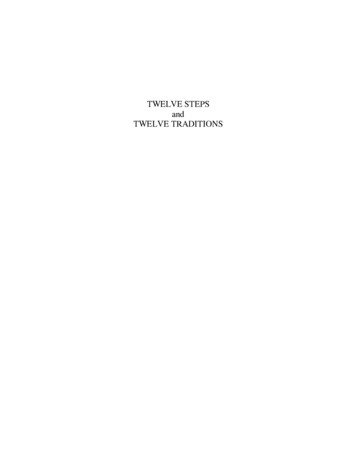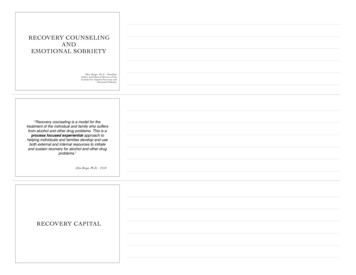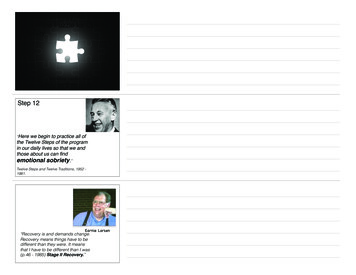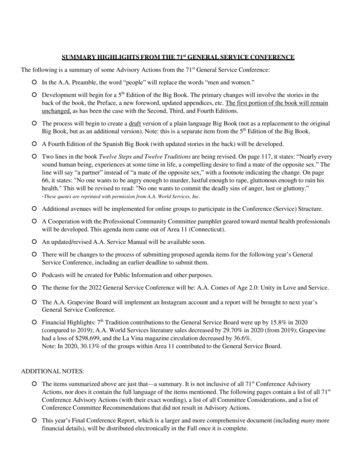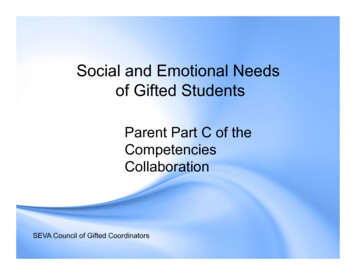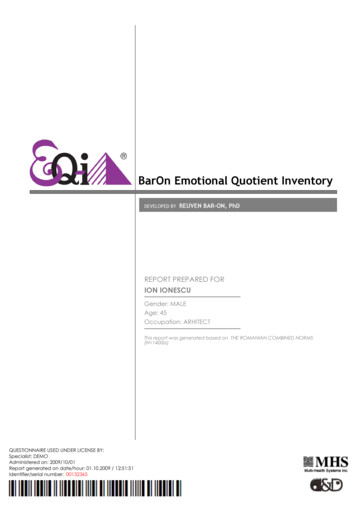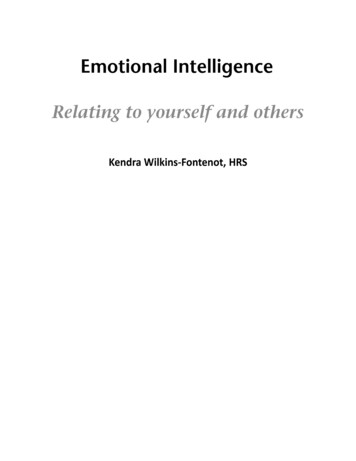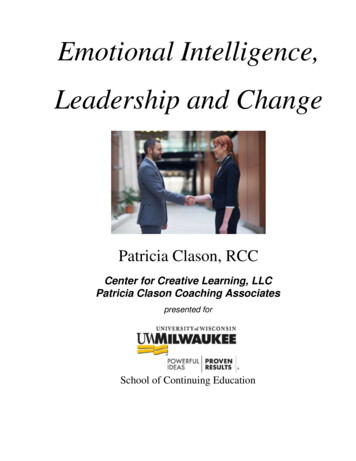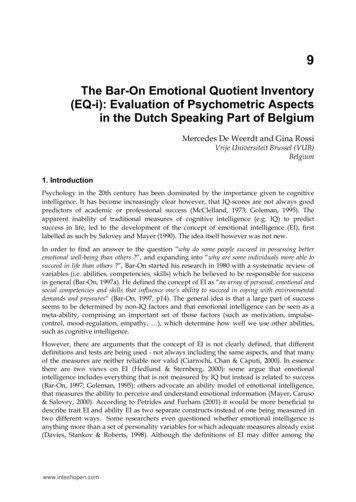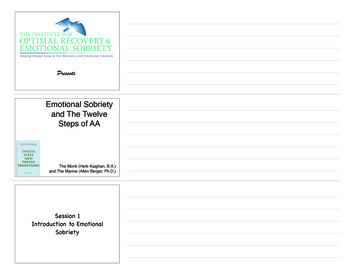
Transcription
PresentsEmotional Sobrietyand The TwelveSteps of AAThe Monk (Herb Kaighan, B.A.)and The Marine (Allen Berger, Ph.D.)Session 1Introduction to EmotionalSobriety
Step 12“Here we begin to practice allTwelve Steps of the program inour daily live so that we andthose about us may findemotional sobriety.”Twelve Steps and Twelve Traditions, 1952 - 1981.The therapeutic value of working the TwelveSteps is optimal living based onemotional sobriety. This is achievedthrough creating a new relationship andexperience with our problem, with our self,and with others.Bill defined emotional sobrietyas “ the development of muchmore real maturity andbalance ”Wilson, B. (1958) Emotional Sobriety: The NextFrontier, Grapevine.
“ in a sense we createourselves through what weare willing to takeresponsibility for (p. 103, 1997)Dr. Nathaniel BrandenTaking Responsibility: Self-Reliance and theAccountable Life.”“ maturing is thetranscendence fromenvironmentalsupport to selfsupport. (p.28). ”Fritz Perls (1969). GestaltTherapy Verbatim.“Expectations lead to the erosion of anyrelationship. The myth that the resolution ofloneliness will result because we have foundan intimate one-on-one relationship is a copout. It begins a toxic process whichdissipates the mutual nourishment thatoccurs when both people are committed tosustaining nourishing interaction andgrowth of their separate selves.”Dr. Jerry Greenwald (1980). Breaking Out of Loneliness.Simon & Shuster: NY.
Earnie described StageTwo Recovery as“.rebuilding of the lifethat was saved in StageOne.”Earnie Larsen“ Stage II Recovery gets at the underlyingpatterns and habits that caused us trouble inthe first place. And if nothing changes, thennothing changes the same results will pop upthrough our whole life (p. 83).”Earnie observed that manyof us “ made a First Steprelative to their addiction,but have not made a FirstStep relative to the livingproblems that underliesall addictions andultimately limits theirability to function inloving relationships.”Emotionalsobriety is thecure for sobersuffering.Earnie LarsenFred Holmquist - Hazelden Author
Definition ofEmotional Sobriety“Emotional Sobriety is when the best in youdoes the thinking and talking for all of you.This state of mind is achieved when what youdo becomes the determining force in youremotional well being rather than allowing youremotional well being to be overly influenced byexternal events or by what others are or are notdoing.”Allen Berger, Ph.D. - 2016“If our freedom dependsexclusively on anotherperson allowing it, welose our own sense of thepart we must exercise inprotecting and definingour own psychologicalspace ”Erving and Miriam Polster, Ph.D.Gestalt Therapy Integrated: Contoursof Theory and Practice (1973).“Psychological well being and effectivefunctioning entails the ability to beaware of the facts and requirements ofexternal reality without sacrificingawareness of inner experience - and tobe aware of inner experience withoutsacrificing the awareness of the factsand requirements of external reality.”Nathaniel Branden (1971, p. 128) , The Disowned Self.Dr. Nathaniel Branden
Desired change is “ produced not byresisting awareness of the individual’simmediate experience, but by the exactopposite course: by becoming open tothat experience.”Dr. Nathaniel BrandenNathaniel Branden (1971, p. 119) , The Disowned Self.The Essence of Emotional SobrietyViktor Frankl, M.D.S“There’s a space between theStimulus and our Response. Inthat space is our power tochoose our response. In ourresponse lies our growth andour freedom - try to livethere.”RThe Shift in the Location of the Emotional Center of Gravityin Emotional SobrietyI’mI’m OKOK evenif ?if ?
Earnie LarsenncriepeExanienerSocialAcceptance, Affection, ConnectivityxpPsychologicalSelf Awareness/Esteem, RespectlEmSelf ActualizationValue, Meaning: Realityuairit?EmotionalSafety, Nurturance, Financial SecurityceHuSelfTranscendenceCompassionSpe?“I believe that learning to make relationshipswork is at the core of full recovery (p. 15).”PhysicalAir, Water, Food, SleepMASLOW: Hierarchy of NeedsSession 2An Overview of theTherapeutic and SpiritualEffects of Working the Steps
The 12 Step Program is apeople growing program thathelps us mature and stand onour own two feet.“The Twelve Steps are aunified, interdependentwhole - each Step requiresand builds upon the other.”Fred Holmquist - Hazelden AuthorHolmquist, F. (2017) Drop the Rock: TheRipple Effect. Hazelden.Nature of the Word“Step”The word “Step” is both a noun and a verb.Noun - Step is a static object that moves usfrom one place to another.Verb - Step is an action taken by the mind andthe body. This use of the word best describesThe Twelve Steps.
Summary of the TwelveStepsStep One - Where we are.Step Two - Where we want to go.Steps Three through Nine - How we get well.Steps Ten through Twelve - How we stay welland grow (Self-Actualize: Optimal Living)“ (the false self)becomes uninterested inthe process of learning,of doing, of gaining stepby step, indeed tends toscorn it. He does notwant to climb amountain; he wants tobe on the peak.”Karen Horney, M.D.Neurosis and Human Growth, the Struggle Towards SelfRealization, 1950Problem AddictionSubstance and / or FearDishonestyReligion
History1932Dr. Carl JungPsychology/TheologySpiritualExperience1933Rev. Frank Buchman/Oxford GroupReligionSix Steps1934Dr. William SilkworthMedicineFatal DiseaseTwelve Step SpiritualityStepsA Relationship With 1-3POWER4-7Self8-9Others10-12Our Way of LifeThe Therapeutic Value of the 12 Steps Emotional SobrietyStep 1Step 2Step 3Step 4Step 5Step 6Step 7Step 8Step 9Step 10Step 11Step 12Shatters our reliance on the falseself and builds a foundation forrecovery that is based on recoveringthe true-self and relocates ourcenter of emotional gravity.Helps us develop insight into ourpersonality and helps us becomeaware of emotional dependency.Increases our emotional maturity. Werepair the damage we’ve done anddevelop healthier relationships withothers.Ensures that we sustain ourprogress, further our growth andself-actualization and integrateour experience.}}}SelfOthersSelf and Others
Session 3Steps One - ThreeStep OneWe admitted we werepowerless over alcohol - thatour lives had becomeunmanageable.Problem PowerlessnessSubstance / Process1/105/10Unmanageable10/10
Unmanageable Bedevilments I am having trouble with personal relationships. I can’t control my emotional natures. I am a prey to misery and depression. I can’t make a living that satisfies me. I have a feeling of uselessness. I am full of fear. I am unhappy. I can’t seem to be of real help to other people nor do I really care!“We are beinglived by the forceswithin ourselves.”Sigmund Freud, M.D.
Growth Force“Many people dedicate theirlives to actualize a conceptof what they should be like,rather than to actualizethemselves.This is againthe curse of the ideal. Thecurse that you should notbe what you are.”Fritz Perls (1969). Gestalt TherapyVerbatim.True Self Model of Personal DevelopmentTyrannyOf theShouldsFalse selfSearch for GlorySearchForGlorySearch for GloryTrue SelfAlienationOfTrue SelfSearch for GlorySearch for GloryIdealized SelfDespisedSelf
“You will never find yourself inwhat you have built to defineyourself.”Michaele A. SingerThe Untethered Soul: The JourneyBeyond Yourself (p. 130)“You may assemble the mostamazing collection of thoughtsand emotions; you may build atruly beautiful, unbelievable,interesting, and dynamicstructure; but obviously it’s notyou.”Michaele A. SingerThe Untethered Soul: The JourneyBeyond Yourself“Where a person experiencesa loss or trauma in childhoodthat undermines his sense ofsecurity and self-acceptance,he would project into hisimage of the future therequirement that itreverse the experiences ofthe past.”Lowen, A. (1975). Bionergetics.Penguin Book.Alexander Lowen, M.D.
“Desperationcreates Illusions illusions createdesperation.”Alexander Lowen, M.D.Basic Anxiety DesperationTrue SelfBasicSolutionFalse SelfAppeal ofLoveAppeal ofFreedom“If you dare to look, you will seethat you have built your entirelife based on the model youhave built around yourself.”The Untethered Soul: The JourneyBeyond YourselfMichaele A. SingerDemand, Claims and ExpectationsAppeal ofMastery
“Basically you attempt to createa sense of stability andsteadiness inside. Thisgenerates a false, butwelcomed, sense of security.”Michaele A. SingerThe Untethered Soul: The JourneyBeyond Yourself“You also want people aroundyou to do the same thing. Youwant people to be steadyenough so you can predict theirbehavior. If they aren’t itdisturbs you.”Michaele A. SingerThe Untethered Soul: The JourneyBeyond Yourself“This is because you havemade your predictions of theirbehavior part of your innermodel (expectations).”The Untethered Soul: The JourneyBeyond YourselfMichaele A. Singer
“This protective shield ofbeliefs and concepts regardingthe outside world acts asinsulation between you and thepeople you interact act with.”Michaele A. SingerThe Untethered Soul: The JourneyBeyond Yourself“By having preconceivednotions about other peoplesbehavior (UnenforceableRules), you feel safer and morein control. Imagine the fear youwould feel if you let that entirewall down.”Michaele A. SingerThe Untethered Soul: The JourneyBeyond Yourself (p. 131).“At the core of this alienationfrom the actual-self is theloss of the feeling of being anactive determining force inour own lives.”Neurosis and Human Growth: TheStruggle Toward Self-RealizationKaren Horney, M.D.
The Idealized Self“The fostering of thephony self is always at theexpense of the real self.”Karen Horney, M.D.Self Analysis - 1942, p. 23“Neurosis is not seen asthe deviation of what aperson ought to be, butprecisely as the methodthe individual uses topreserve his owncenteredness, his ownexistence.”Rollo May, Ph.D.
“The integrity of a person isimpaired because of the alienationfrom the self all these forceslead to a diminished capacityfor being sincere with oneself.”Karen Horney, M.D.Neurosis and Human Growth: The Struggle Toward Self-RealizationOn the Importance of the True-SelfMaslow (1962) argued that a characteristic must beconsidered a basic need if it meets the followingconditions:a. It’s absence breeds illness.b. It’s presence prevents illness.c. It’s restoration cures illness.Step 1“We perceive that only through utter defeatwe are able to take the first steps towardliberation and strength.”Twelve Steps and Twelve Traditions, AlcoholicsAnonymous, 1952.
Step 1“Who wishes to be be rigorouslyhonest and tolerant? Who wants toconfess his thoughts to another andmake restitution for harm done? Nothe average alcoholic, self-centered inthe extreme, doesn’t care for thisprospect - unless he has to do thesethings in order to stay alive himself.”Twelve Steps and Twelve Traditions, AlcoholicsAnonymous, 1952.“The therapeutic value in thedisillusioning process lies inthe possibility that, with theweakening of the obstructiveforces, the constructiveforces of the real self have achance to grow.”Karen Horney, M.D.Neurosis and Human Growth: The Struggle TowardSelf-Realization - 1950.Step TwoCame to believe that a powergreater than ourselves couldrestore us to sanity.
Step Two Decision AboutPOWERStep 2“Sanity is defined as ‘soundnessof mind.’ Yet no alcoholic, soberlyanalyzing his destructivebehavior, whether the destructionfell on the dining room furnitureor his own moral fiber, can claimsoundness of mind for himself.”Twelve Steps and Twelve Traditions,Alcoholics Anonymous, 1952Step ThreeMade a decision to turn our willand our lives over the care ofGod, as we understood him.
Step Three Decision ForRELATIONSHIPPOWERStep 3“The more we become willing todepend on a Higher Power, themore independent we actually are.Therefore dependence as AApractices it, is really the means ofgaining true independence of thespirit.”Twelve Steps and Twelve Traditions, AlcoholicsAnonymous, 1952Step 3“Let’s examine for a momentthis idea of dependence at thelevel of everyday living. In thisarea it is startling to discoverhow dependent we really are,and how unconscious we areof that dependence.”Twelve Steps and Twelve Traditions, AlcoholicsAnonymous, 1952
Step 3“We realize that the worddependence is as distasteful tomany psychiatrists andpsychologists as it is toalcoholics. Like our professionalfriends, we, too are aware thatthere are wrong forms ofdependence.”Twelve Steps and Twelve Traditions, AlcoholicsAnonymous, 1952Session 4Steps Four - SevenStep FourWe made a searching andfearless moral inventory ofourselves.
Step Four Name mentsSelf-CenterednessStep 4“Step Four is our vigorous andpainstaking effort to discoverwhat these liabilities in each of ushave been, and are. We want tofind out how, when and whereour natural desires havewarped us. We wish to looksquarely at the unhappiness thatthis has caused others andourselves.”Twelve Steps and Twelve Traditions, AlcoholicsAnonymous, 1952Step 4“By discovering what ouremotional deformities are,we can move towards theircorrection. Without a willingand persistent effort to dothis, there can be littlesobriety or contentment forus.”Twelve Steps and Twelve Traditions, AlcoholicsAnonymous, 1952
Step 4“ For most of us selfjustification was the maker ofexcuses; excuses of coursefor drinking, and for all kindsof crazy and damagingconduct. We had made theinvention of alibis a fineart.”Twelve Steps and Twelve Traditions, AlcoholicsAnonymous, 1952Step 4“ To see how erratic emotionsvictimized us often took a longtime First of all, we had to admitthat we had many of thesedefects, even though suchdisclosures were painfuland humiliating.”Twelve Steps and Twelve Traditions, Alcoholics Anonymous, 1952 1981Step 4“ We learned that if we wereseriously disturbed our firstneed was to quiet thatdisturbance, regardless ofwho or what we thoughtcaused it.”Twelve Steps and Twelve Traditions,Alcoholics Anonymous, 1952
Step 4“ Where other peoplewere concerned, we hadto drop the word blamefrom our language. Thisrequired greatwillingness to begin.”Twelve Steps and Twelve Traditions,Alcoholics Anonymous, 1952Step 4“It never occurred to usthat we needed tochange ourselves tomeet conditions,whatever they were.”Twelve Steps and TwelveTraditions, AlcoholicsAnonymous, 1952Step 4“Nearly every serious emotionalproblem can be seen as a caseof misdirected instinct Everytime a person imposes hisinstincts unreasonably uponothers, unhappiness follows.”Twelve Steps and Twelve Traditions, AlcoholicsAnonymous, 1952 - 1981
Step 4“Demands made upon people fortoo much attention, protection,and love can only invitedomination or revulsion Whenan individual’s desire for prestigebecomes uncontrollable otherpeople suffer and often revolt.”Twelve Steps and Twelve Traditions, Alcoholics Anonymous,1952 - 1981Step 4“In these ways we are setin conflict not only withourselves, but with otherpeople too ”Twelve Steps and Twelve Traditions,Alcoholics Anonymous, 1952 - 1981Step FiveWe admitted to God, toourselves, and to anotherhuman being the exact natureof our wrongs.
Step Five Reveal mentsSelf-CenterednessStep 5“All of the A.A.’s Twelve Steps ask usto go contrary to our natural desires they all delate our egos.”Twelve Steps and Twelve Traditions,Alcoholics Anonymous, 1952 - 1981.Step 5“To those who have madeprogress in A.A., it amountsto a clear recognition ofwhat and who we reallyare, followed by a sincereattempt to become what wecould be.”Twelve Steps and Twelve Traditions, AlcoholicsAnonymous, 1952 - 1981
Step 5“Therefore our first practicalstep toward humility mustconsist of recognizing ourdeficiencies. No defect canbe corrected unless weclearly see what it is.”Twelve Steps and Twelve Traditions, AlcoholicsAnonymous, 1952 - 1981Step SixWere entirely ready to haveGod remove all these defectsof character.Step Six Defects of Character Name them Resentment Fear Sex (Dishonesty) Selfishness Willingness to have them removed
Step 6“So Step Six is A.A.’s way of statingthe best possible attitude one cantake in order to make a beginning ofthis lifetime job. This does not meanthat we expect all our characterdefects to be lifted out of us A fewof them may be, but with most ofthem we shall have to be content withpatient improvement.”Twelve Steps and Twelve Traditions, AlcoholicsAnonymous, 1952 - 1981.Step 6“What we must recognize now is thatwe exult in some of our defects. Wereally love them Self-righteousanger also can be very enjoyable. Ina perverse way we can actually takesatisfaction from the fact that manypeople annoy us, for it being acomfortable feeling of superiority.”Twelve Steps and Twelve Traditions,Alcoholics Anonymous, 1952 - 1981.Step 6“Only Step One, where we made the 100percent admission we were powerlessover alcohol, can be practiced withabsolute perfection. The remaining elevenSteps state perfect ideals. These are thegoals toward which we look, and themeasuring sticks by which we estimateour progress. ”Twelve Steps and Twelve Traditions, AlcoholicsAnonymous, 1952 - 1981.
Step 6“If we would gain any real advantage inthe use of this Step on problems otherthan alcohol, we shall need to make abrand new venture into openmindedness.”Twelve Steps and Twelve Traditions,Alcoholics Anonymous, 1952 - 1981.Step 6“Maybe I can postpone dealing with someof my problems indefinitely. Of course,this won’t do. Such a bluffing of oneselfwill have to go the way of any anotherpleasant rationalization. At the very least,we shall have to come to grips withsome or our worst character defectsand take action toward their removal asquickly as we can.”Twelve Steps and Twelve Traditions, AlcoholicsAnonymous, 1952 - 1981.Step SevenHumbly asked Him to removeour shortcomings.
Step Seven Shortcomings Accept powerlessness Pray for removalStep 7“Never was there enough of what wethought we needed We had lackedthe perspective that characterbuilding and spiritual values had tocome first, that material satisfactions(having) were not the purpose ofliving.”Twelve Steps and Twelve Traditions, 1952 1981.Step 7.we reluctantly come to gripswith those serious characterflaws that made problemdrinkers of us in the first place,“flaws which must be dealtwith to prevent a retreatinto alcoholism onceagain.”Twelve Steps and Twelve Traditions, 1952 - 1981.
Step 7“Without some degree of humility noalcoholic can stay sober at all. Nearly allof A.A.’s have found, too, that unlessthey develop much more of this preciousquality than may be required just forsobriety, they still haven’t much chanceof becoming happy.”Twelve Steps and Twelve Traditions, 1952 1981.Step 7“Never was there enough of what wethought we needed We had lacked theperspective that character building andspiritual values had to come first, andthat material satisfactions were not thepurpose of living.”Twelve Steps and Twelve Traditions, 1952 - 1981.Step 7“For us, the process of gaining a newperspective was unbelievably painful.It was only by repeated humiliationsthat we were forced to learn somethingabout humility.”Twelve Steps and Twelve Traditions, 1952 1981.
Session 5Steps Eight - TenStep EightMade a list of all persons wehad harmed and becamewilling to make amends tothem all.Forgiveness: The ProcessName ItMy HurtUnderstand ItMy HopeIdentify RulesMy BeliefsAcknowledge RealityMy AttitudesResponsibilityMy Acceptance/DecisionImplement DecisionMy Action
Step Eight List Harm(s) to Others1. Who did I diminish?2. What did I do?3. What harm did I cause?4. What specific action is necessary?5. Am I willing to repair damage?Step Eight“Steps Eight and Nine are concernedwith personal relations. First, we take alook backward and try to discover wherewe have been at fault; next we makevigorous attempt to repair the damagewe have done; and third, having thuscleaned away the debris of our past, weconsider how, with our newfoundknowledge of ourselves, we maydevelop the best possible relationswith every human being we know.”Twelve Steps and Twelve Traditions, Alcoholics Anonymous,1952 - 1981.Step Eight“. necessary that we extricate from anexamination of our personal relationsevery bit of information aboutourselves and our fundamentaldifficulties. Since defective relationswith human beings have nearlyalways been the immediatecauses of our woes, including ouralcoholism Calm, thoughtfulreflection on personal relations candeepen our insight.”Twelve Steps and Twelve Traditions, Alcoholics Anonymous,1952 - 1981.
Step Eight“What kind of “harm” do people doone another, anyway? To definethe word “harm” in a practical way,we might call it the result ofinstincts in collision, which causephysical, mental, emotional, orspiritual damage to people.”Twelve Steps and Twelve Traditions, AlcoholicsAnonymous, 1952 - 1981.Step Eight“Having carefully surveyed thiswhole area of human relations,and having decided exactly whatpersonality traits in us injured anddisturbed others. ”Twelve Steps and Twelve Traditions, AlcoholicsAnonymous, 1952 - 1981.Step NineMade direct amends to suchpeople wherever possible,except when to do so wouldinjure them or others.
Step Nine Amends Process1. Describe harm2. Ask: “Any other harm?”3. Suggest amends4. Ask: “Any other amends?”Step Nine“As soon as we begin to feelconfident in our new way of lifeand have begun, by our behaviorand example, to convince thoseabout us that we are indeedchanging for the better, it isusually safe to talk in completefrankness with this who have beenseriously affected ”Twelve Steps and Twelve Traditions, AlcoholicsAnonymous, 1952 - 1981.Step Nine“Above all, we should try to beabsolutely sure that we are notdelaying because we are afraid.For the readiness to take fullconsequences of our past acts,and to take responsibility for the(emotional) well being of others atthe same time, is the very spirit ofStep Nine.”Twelve Steps and Twelve Traditions, Alcoholics
Extreme Ownership is akey to emotional sobriety.Step TenContinued to take personalinventory and when we werewrong promptly admitted it.Step Ten Enter World of SpiritBoPhysical SobrietyMindduredytCNollWiRecovered
Step Ten Our Way of Life: InventoryWatch For: Resentment Fear Dishonesty SelfishnessTake Action: Pray Discuss Amend ServiceResults: Forgiveness Trust Honesty LoveEmotional SobrietyOur Way of LifeClear ChannelStep 10 InventoryFill ChannelStep 11 Prayer/MeditationEmpty ChannelStep 12 ServiceStep Ten“ It is a spiritual axiomthat every time we aredisturbed, no matterwhat the cause, there issomething wrong withus.”Twelve Steps and Twelve Traditions,Alcoholics Anonymous, 1952 - 1981.
Step Ten“A spot check inventory taken in themidst of such disturbance can be ofvery great help in quieting stormyemotions.”Twelve Steps and Twelve Traditions,Alcoholics Anonymous, 1952 - 1981.Step Ten“The quick inventory is aimed at ourdaily ups and downs, especiallythose where people or new eventsthrow us off balance and tempt usto make mistakes.”Twelve Steps and Twelve Traditions,Alcoholics Anonymous, 1952 - 1981.Step Ten“In all these situations we need selfrestraint, honest analysis of whatis involved, a willingness to admitwhen the fault is ours, and an equalwillingness to forgive when thefault is elsewhere, We need not bediscouraged when we fall into theerror of our old ways, for thesedisciplines are not easy. We shalllook for progress, not forperfection.”Twelve Steps and Twelve Traditions,Alcoholics Anonymous, 1952 - 1981.
Step Ten“Our first objective will be thedevelopment of self-restraint. Thiscarries a top priority rating Nothing pays off like restraint oftongue and pen we should trainourselves to step back and think.For we can neither think nor act togood purpose until the habit ofself-restraint has becomeautomatic.”Twelve Steps and Twelve Traditions,Alcoholics Anonymous, 1952 - 1981.Step Ten“Finally, we begin to see that all people,including ourselves, are to some extentemotionally ill (emotionally dependent)as well as frequently wrong, and then weapproach true tolerance and see whatreal love for our fellows actually means.It will become more and more evident aswe go forward that it is pointless tobecome angry, or to get hurt bypeople who, like us, are suffering fromthe pains of growing up.”Twelve Steps and Twelve Traditions, AlcoholicsAnonymous, 1952 - 1981.Step Ten“We can try to stop makingunreasonable demands upon thosewe love.”Twelve Steps and Twelve Traditions,Alcoholics Anonymous, 1952 - 1981.
Session 6Steps Eleven and TwelveStep ElevenSought through prayer andmeditation to improve ourconscious contact with God, as weunderstood Him, praying only forknowledge of his will for us andthe power to carry that out.Step Eleven Prayer and MeditationEVENINGMORNINGALL DAYInventoryThinkConsiderListenBe AwakePause
Our Way of Life Spiritual GrowthSTEP ELEVEN“Improve”STEP TUAL SOBRIETYStep 11There is a direct linkageamong self-examination,meditation, and prayer. Takenseparately these practices canbring much relief and benefit.But when they are logicallyinterwoven, the result is anunshakeable foundation forlife.”“Twelve Steps and Twelve Traditions, 1952 - 1981.Step 11 self searching is themeans by which we bringnew vision, action, andgrace to bear upon thedark and negative sides ofour natures.”“Twelve Steps and Twelve Traditions, 1952 - 1981.
Step 11 If at these points ouremotional disturbancehappens to be great, we willsurely keep our balance,provided we remember, andrepeat to ourselves, aparticular prayer or phrasethat has appealed to us inour reading or meditation.”“Twelve Steps and Twelve Traditions, 1952 - 1981.Step 11Just saying it over andover will often enable us toclear a channel choked upwith anger, fear, frustrationor misunderstanding ”“Twelve Steps and Twelve Traditions, 1952 - 1981.Step 11At these critical moments, ifwe remind ourselves that it is“better to comfort than to becomforted, better tounderstand than to beunderstood, to love than tobe loved,” we will be followingthe intent of Step Eleven.”“Twelve Steps and Twelve Traditions, 1952 - 1981.
Step TwelveHaving had a spiritualawakening as the result ofthese steps, we tried to carrythis message to alcoholics,and to practice theseprinciples in all our affairs.Step Twelve Spiritual AwakeningChangeThinkFeelBehaveDone to us NOT by usStep Twelve Our Way of LifeCarry MessageImmunization
Step Twelve Our Way of LifePractice Principlesª Relationshipsª Familyª Workª Fellowship/CommunitySpirituality Process NOT odOur Way of LifersClean HouseTwelve Step Spirituality
Step 12“Herewe begin to practice all ofthe Twelve Steps of the programin our daily lives so that we andthose about us can findemotional sobriety.”Twelve Steps and Twelve Traditions, 1952 1981.Step 12“Andas we grow spiritually, wefind that our old attitudes towardour instincts need to undergodrastic revisions. Our desires foremotional security and wealth, forpersonal prestige and power, forromance, and for familysatisfactions - all these have to betempered and redirected.”Twelve Steps and Twelve Traditions, 1952 1981.Step 12“Ifwe place instincts first, wehave got the cart before thehorse; we shall be pulledbackwards into disillusionment.But when we are willing toplace spiritual growth first then and only then do wehave a real chance (foremotional sobriety).”Twelve Steps and Twelve Traditions, 1952- 1981.
Step 12“Ourdemand for emotionalsecurity, for our own way,had constantly thrown usinto unworkable relationswith other people. Though wewere sometimes quiteunconscious of this, the resulthad always been the same.”Twelve Steps and Twelve Traditions, 1952- 1981.Step 12“Eitherwe had tried to playGod and dominate thoseabout us, or we hadinsisted on beingoverdependent upon them.”Twelve Steps and Twelve Traditions,1952 - 1981.Step 12“Wherepeople had temporarily letus run their lives as though theywere still children, we felt veryhappy and secure ourselves. Butwhen they finally resisted or ranaway, we were bitterly hurt anddisappointed. We blamed them,being quite unable see that ourunreasonable demands had beenthe cause.”Twelve Steps and Twelve Traditions, 1952 1981.
Step 12“Whenwe had taken the oppositetack and had insisted, like infantsourselves, that people protect andtake care of us or that the worldowed us a living, then the resulthad been equally unfortunate.This often caused the people wehad loved most to push us asideor perhaps desert us entirely.”Twelve Steps and Twelve Traditions, 1952 1981.Step 12“Ourdisillusionment had beenhard to bear. We couldn’timagine people acting that waytoward us. We had failed to seethat though adult in years we werestill behaving childishly, trying toturn everybody - friends, wives,husbands, and even the worlditself - into protective parents.”Twelve Steps and Twelve Traditions, 1952 1981.Step 12“Wehad refused to learn thevery hard lesson that overdependence upon people isunsuccessful because all peopleare fallible, and even the best ofthem will sometimes let us down,especially when our demandfor attention becomeunreasonable.”Twelve Steps and Twelve Traditions, 1952 1981.
Emotional Sobriety is aboutgrowing ourselves up by discovering newpossibilities in the way we cope with life,and living in the space between theStimulus and the Response.“We had to learn ourselves and,furthermore, we had to teach thedespairing men, that it did not reallymatter what we expected from life, butrather what life expected fromus .we needed to think of ourselvesas those who were being questionedby life Life
The Therapeutic Value of the 12 Steps Emotional Sobriety Step 1 Step 2 Step 3 Step 4 Step 5 Step 6 Step 7 Step 8 Step 9 Step 10 Step 11 Step 12 . behavior, whether the destruction fell on the dining room furniture or his o
